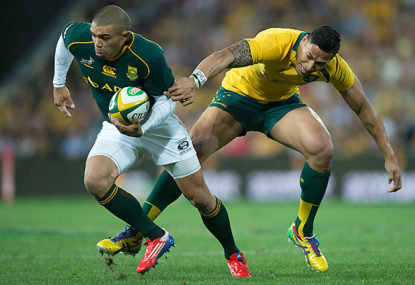South Africa was rightly shunned by world rugby when the Springboks barred qualified players from the chance to play Test rugby for their nation. Yet South Africa has revived the practice and World Rugby is silent; indeed, tacitly approves.
South Africa was only symbolically ‘democratic’ under the rule of the Nationalist Party; the system was corrupt, resting on a false belief of inherent, heritable racial characteristics, and moral superiority.
A series of apartheid programmes sought to slice and dice various communities into divided camps of antipathy. Sport was used as an evil fulcrum, instead of a mechanism of hope, to rise up.
Isolation trumped the practice; rejoining world sport was supposed to bring with it an adherence to global standards.
But South Africa’s democracy is still corrupted, by the new one-party rulers, in the African National Congress’ overt goal of absolute demographic representativity. This should pose grave consequences for South Africa’s sporting teams.
Quotas based on race have no place in sport if Olympic charters or governing bodies’ mission statements are to be believed. South Africa is a key member of World Rugby; perhaps other members are loathe to criticise?
Obviously, South Africa’s shameful history of robbing talented athletes of the chance to shine on the world stage places an extraordinary responsibility on bodies such as SARU to find more ways to develop rugby in townships and as yet unreached disadvantaged communities.
South Africa’s government has been woeful in adding opportunities for the least privileged in the country; corruption can have a profoundly negative effect on social mobility, economic advancement, and the kinds of truly sustainable growth a downtrodden society needs.
Has the ANC neglected sport in the poorest sectors on purpose? Or was it just a question of poor priorities? Does the ANC believe in rugby as a unifying, uplifting device?
If the ANC really wants more elite black rugby players, why aren’t there more?
There are many more factors that may cause a lag time in a changing racial composition of the Springboks.
First, rugby is more expensive to develop into a league-quality sport than soccer. There are many more technical, strength, and body type requirements in rugby; safety is an unavoidable duty.
Second, it is a very rough sport, and many parents who did not themselves grow up in a rugby culture may be reluctant to let their boys play this code. I am not aware of any effective legal device in South Africa to ‘force’ a family or community to embrace a sport.
Third, elite sport entertainment is big business; rugby is up against sophisticated competitors. Cricket, soccer and MMA all know how to attract teenage boys in better, faster, more lasting ways than rugby. Even golf and tennis have superior marketing strategies.
But chasing an elusive proportionality with a hard racial quota in all of South Africa’s national sports teams is not the answer to a grass-roots marketing, development, and competition problem.
The question I have is how racial quotas in South Africa, of all places, are acceptable to the international sporting community.
Almost every international sporting body prohibits racial discrimination and government interference in sport:
- The Olympic Charter forbids any form of racial discrimination. The Charter’s Fundamental Principles of Olympism specifically provide that “any form of discrimination with regard to a country or a person on grounds of race, religion, politics, gender or otherwise is incompatible with belonging to the Olympic Movement” and “Belonging to the Olympic Movement requires compliance with the Olympic Charter and recognition by the IOC”.
- South Africa’s membership in the Commonwealth requires compliance with the Constitution of the Commonwealth Games Federation. Article 7 of that Constitution provides that “for the Commonwealth Games and generally in respect of all activities of the Federation and events under its control, there shall be no discrimination against any country or person on any grounds whatsoever, including race, colour, gender, religion or politics”.
- The ICC condemns racism of any form in its anti-racism policy, requiring the ICC and all of its members not to “unlawfully discriminate between persons based on their race, religion, culture, colour, descent, and/or national or ethnic origin”.
- FIFA’s statutes prohibit “Discrimination of any kind against a country, private person or group of people on account of race, skin colour, ethnic, national or social origin, gender, language, religion, political opinion or any other opinion, wealth, birth or any other status, sexual orientation or any other reason is strictly prohibited and punishable by suspension or expulsion”.
South Africa’s very own constitution (at Section 9[4]) and the core values of equality, human rights and non-racialism forbid discrimination on grounds of race and ethnic origin.
Racial quotas contravene the Employment Equity Act 55 of 1998, which authorises numerical targets, but specifically prohibits quotas.
Rugby players are employees. Racial quotas for labour are squarely wrong.
Sport must be accessible to all South Africans, but this needs to be done through development, not imposing blanket quotas that cap the numbers of minority communities in South Africa who may dearly love a particular sport (such as Indians who embrace cricket as a defining cultural characteristic, or Coloureds who love rugby, but are not considered ‘ethnic black African’).
Those different cultural tastes and interests are difficult to engineer around. Do we want that? Isn’t that the beauty of a rainbow nation?
South Africa should field the best possible teams in every sport in which we compete. Then we will be proud of our sports stars because they are ours, not because they belong to a particular race.
Racial quotas should isolate South Africa again, and definitely are a source of division, rather than national unity.





























































































